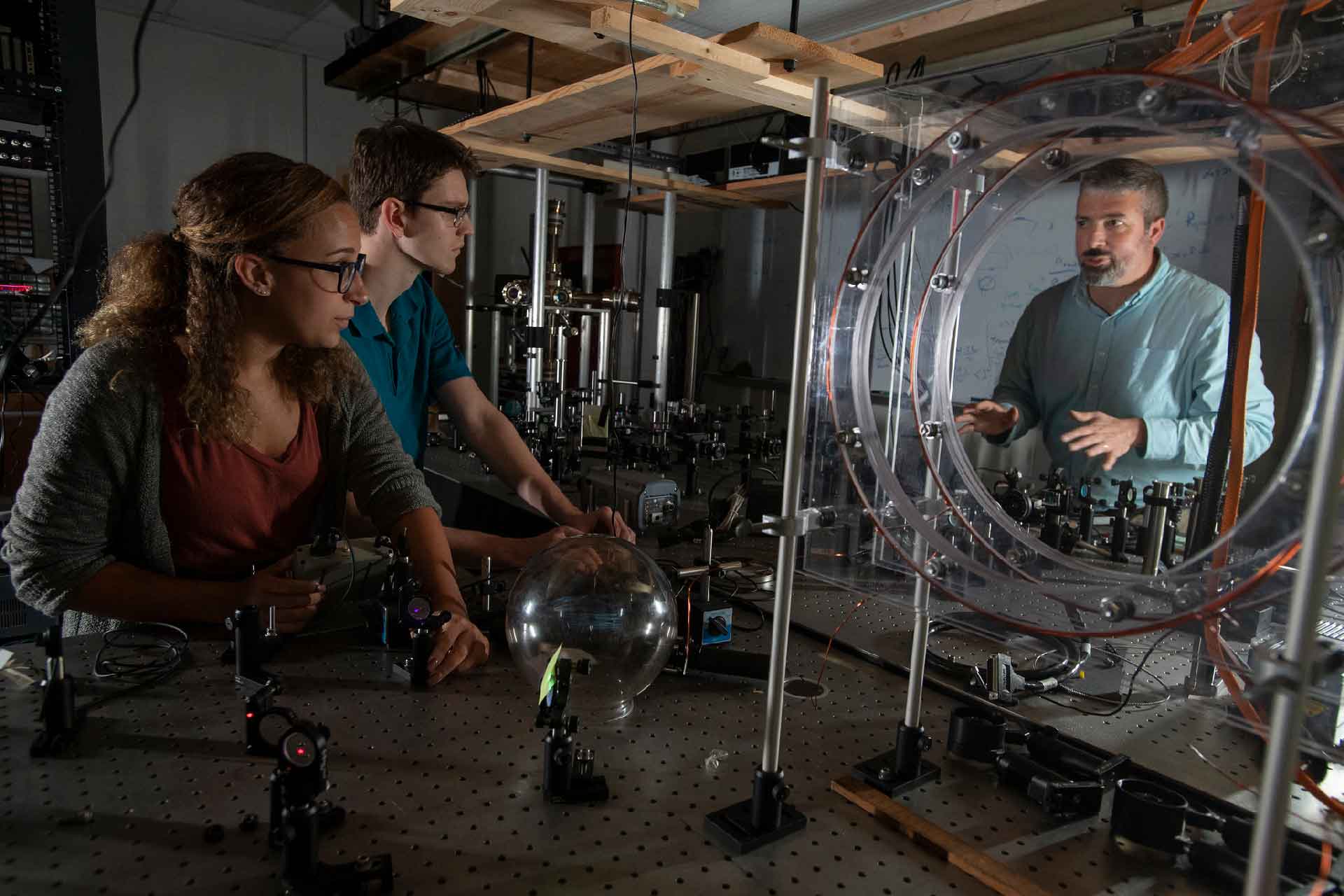As part of the Foundational Study requirement, all students must take courses in a broad range of subjects. At St. Mary’s College, we think of this as your LEAD Knowledge and Methods.
LEAD Knowledge and Methods courses expose you to a range of subjects and methodologies. They make sure that all St. Mary’s College students develop their skills of interpretation, expression, and evaluation-- that is, they help you to be good critical thinkers and good communicators. They invite students to consider the many ways through which we come to know about the world-- and the impact such knowledge has had on our past, and will have on our future.
Students can fulfill LEAD Knowledge and Methods requirements two ways: by completing LEAD Inquiry or a LEAD Exploration.
What are Inquiries?

The urge to explore, to know more, to seek out and expand the boundaries of our knowledge with every tool at our disposal defines the habit of learning at St. Mary’s College of Maryland.
To these ends, LEAD Inquiries are specially-designed sets of courses that allow you to fulfill your LEAD Knowledge and Methods requirements for LEAD by exploring an idea, question, concept, or problem. While every SMCM student has to meet learning outcomes in the arts, cultural literacy, humanities, mathematics, natural sciences (with lab), and social and behavioral sciences, students in Inquiries use these requirements to experience the impact of multiple disciplinary perspectives on a central topic. Inquiry students also complete a 1-credit Integrated Learning Portfolio that illustrates how their course experiences have shaped their understanding of the Inquiry topic. Consequently, students in an Inquiry will fulfill their LEAD Knowledge and Methods requirements in 4-5 classes, whereas other students will need 6 classes to do so.
Justice
This Inquiry explores the concept of justice as it relates to political systems and to protest. Students will have the opportunity to apply these ideas broadly or to focus more specifically on race in connection to justice - both philosophically, and in terms of the lived experiences through which we come to know injustice and how to respond to it.
CLIMATE
Students in the Climate Inquiry take courses that deepen their understanding of the environment and climate change, providing the tools for thinking and communicating about climate change from a range of perspectives. This is a great option for environmental studies majors, as the inquiry begins with ENST 100 - Introduction to Environmental Studies.
IDEA of the West
In the Idea of the West, students focus on the emergence - and contemporary impact - of what we have come to call the “Western World.” From developments in science, technology, and literature to European colonial conquests - and later, empires - that reshaped the globe, understanding the West is one way to unpack the complexity of the world we live in now.
Public and Environmental Health
Public health is an inherently interdisciplinary topic. To understand what determines a person’s-- or a community’s-- health requires more than a strictly scientific account of disease. In this inquiry, you’ll take courses that let you explore the connections between health and the environment to understand better the many factors that shape health outcomes across the globe.
The Meaning of Music
Music gives us joy. Sometimes it soothes our souls; other times it creates drama and excitement. But how? In the Meaning of Music, you’ll explore your own listening experience, by understanding music from aesthetic, social, cultural, and scientific perspectives.
Note: This Inquiry is not enrolling new students.Gender and Power (GAP)
GAP offers an interdisciplinary examination of how gender and sexuality shape aspects of our daily lives, and how they are related to other social hierarchies such as race, ethnicity, nationality, class, and ability. Students take courses that underscore the notion of gender justice -- the obligation to make connections between academic knowledge and experience outside the classroom through community, activism, and external experience. This Inquiry also offers an opportunity for greater depth in the study of gender and sexuality through the WGSX minor.
Latinx Studies
The Latinx population is the largest and fastest-growing ethnic and racial minority group in the United States. This field of study explores the history of this population and its impact on today’s US society. By bringing together a variety of fields of knowledges, including disciplines of the social sciences and the humanities, this inquiry explores the historical origin and political struggles of Latin American immigrants and Americans of Latin American descent. The Latinx heterogenous histories and experiences are thus studied from an interdisciplinary perspective and in the work of Latinx artists, activists, and intellectuals.
Global Studies
The Global Studies Inquiry seeks to help students attain a well-integrated and dynamic understanding of international developments in order to prepare them to actively engage in the globalized world of the twenty-first century. Further, this inquiry enables students to grapple with the many ways in which we are increasingly interconnected and interdependent, and to identify methods by which to address global systems, problems, and opportunities.
Asia In The World
Asia’s importance in the global economy and impact on geopolitical dynamics have a direct bearing on our lives in the U.S. today. Any effort to meet the challenges of the present as we strive to create a sustainable future for all must include the peoples and countries of Asia for any solutions to succeed. Asian cultures, religions, and philosophies have long enlivened and enlightened us (Judaism, Christianity, Islam, Buddhism, Daoism, etc. were all born in Asia after all!), while contemporary Asian popular culture – from Bollywood & Anime to Bubble Tea & K-pop – point to continuing “soft power” influence as well. This inquiry provides the context and methodological tools for you to develop your own path to a deeper understanding of some the many histories, societies, and cultures of Asia and the Asian diaspora throughout the world.

What is Exploration?
This approach to LEAD Knowledge and Methods requires you to take six courses, one from each of the following areas: Arts, Cultural Literacy, Humanities, Mathematics, Natural Sciences, and Social and Behavioral Sciences.
Exploration
This link will take you to the course catalog where you will find what courses fulfill each of the six area requirements.
